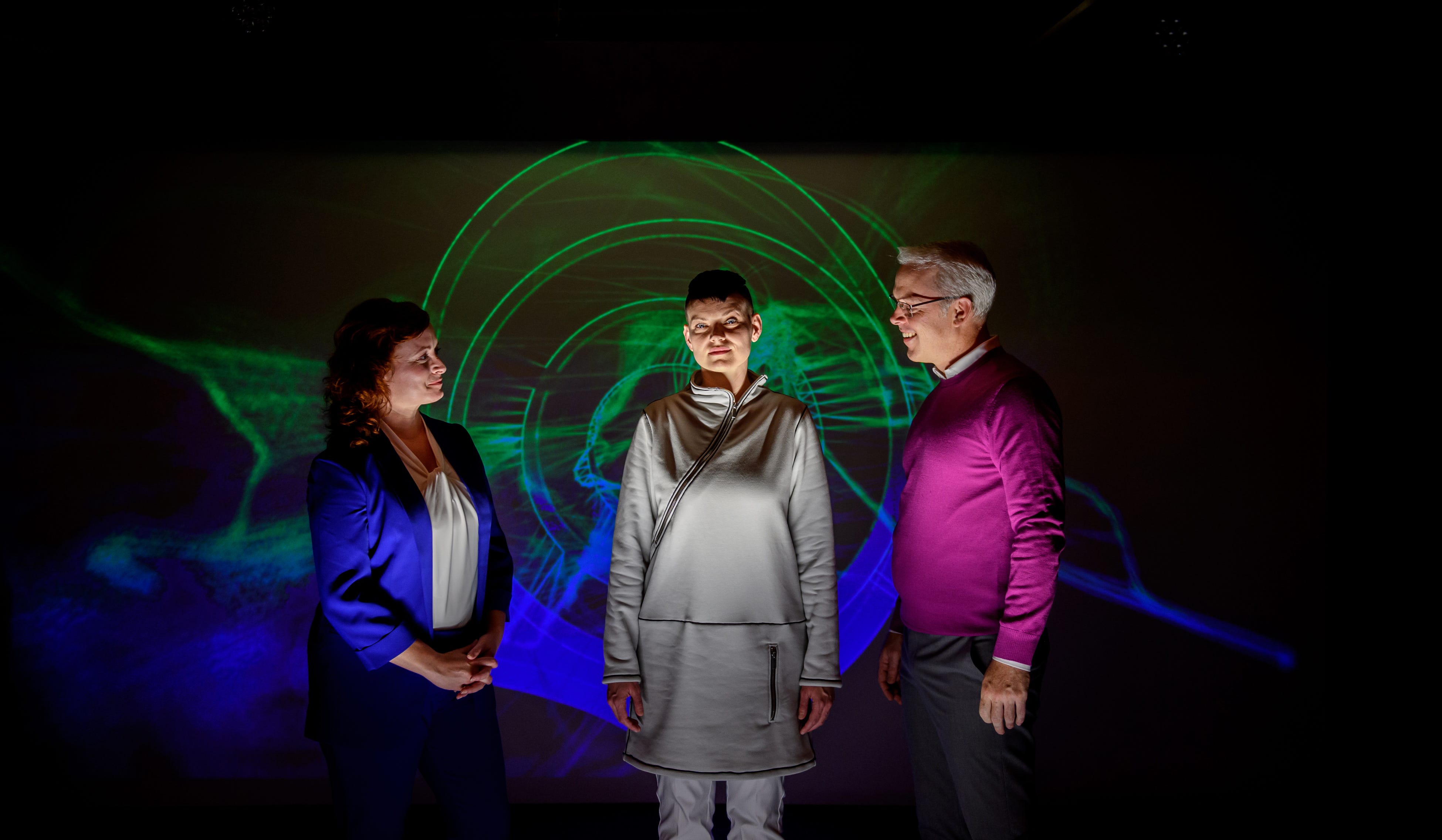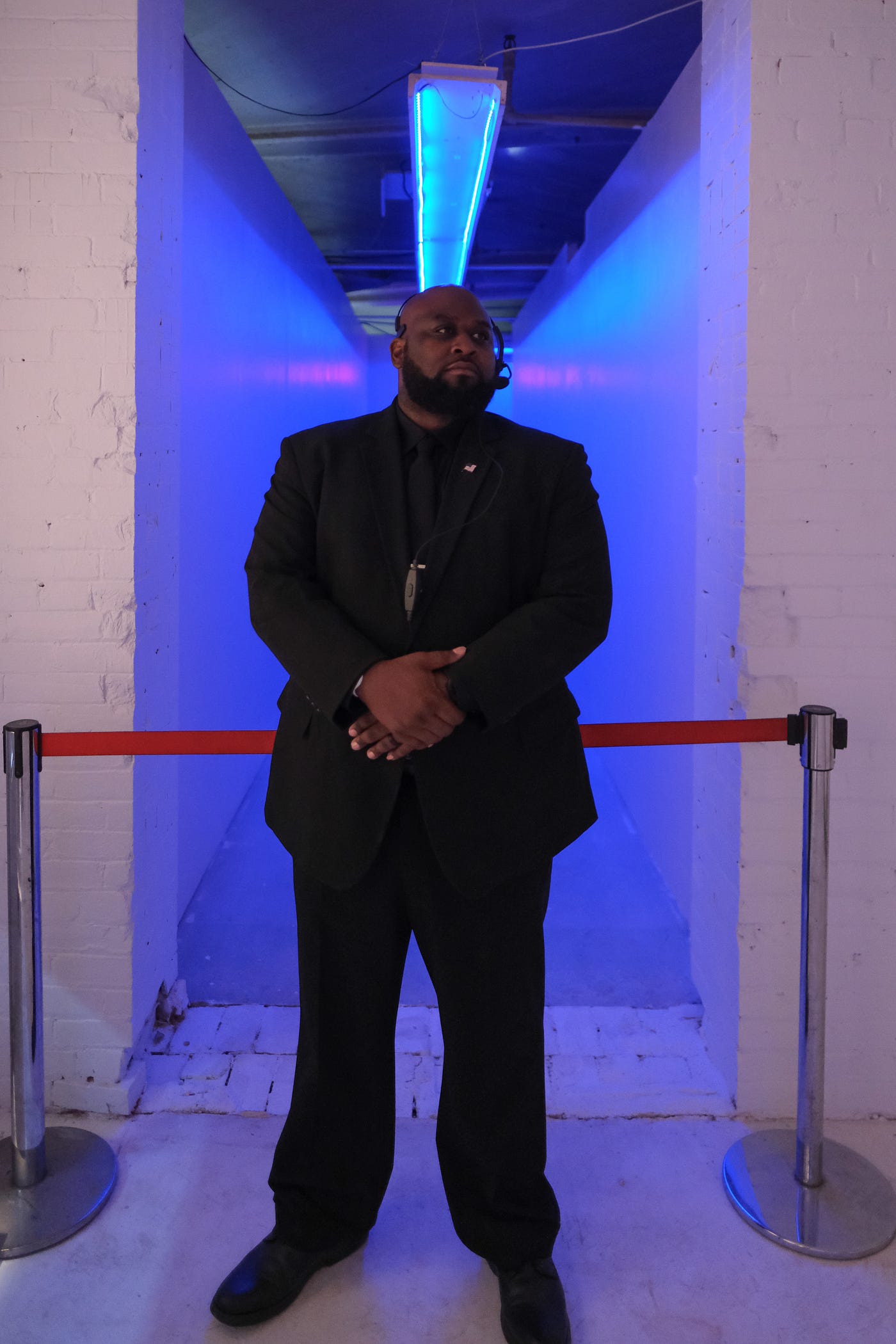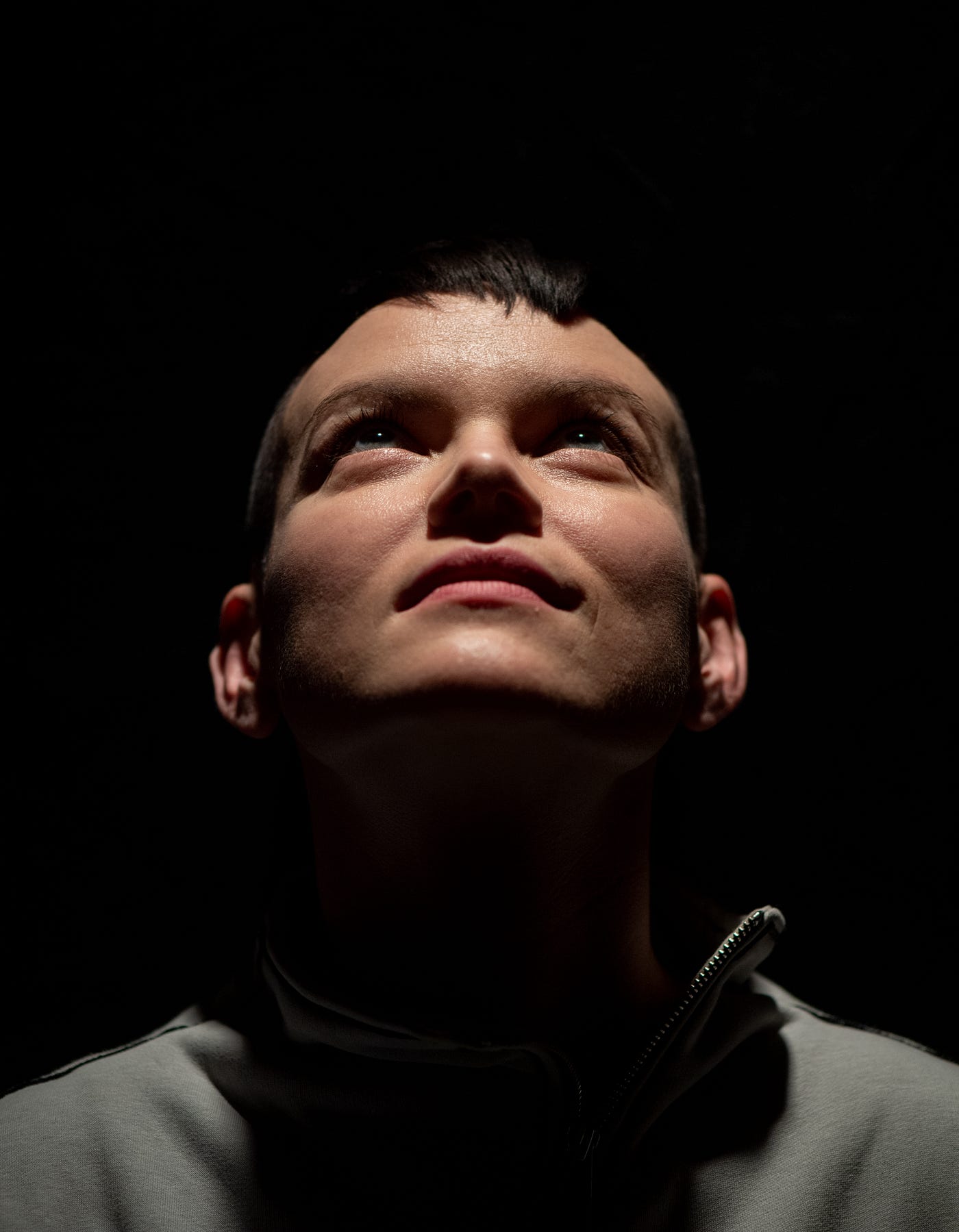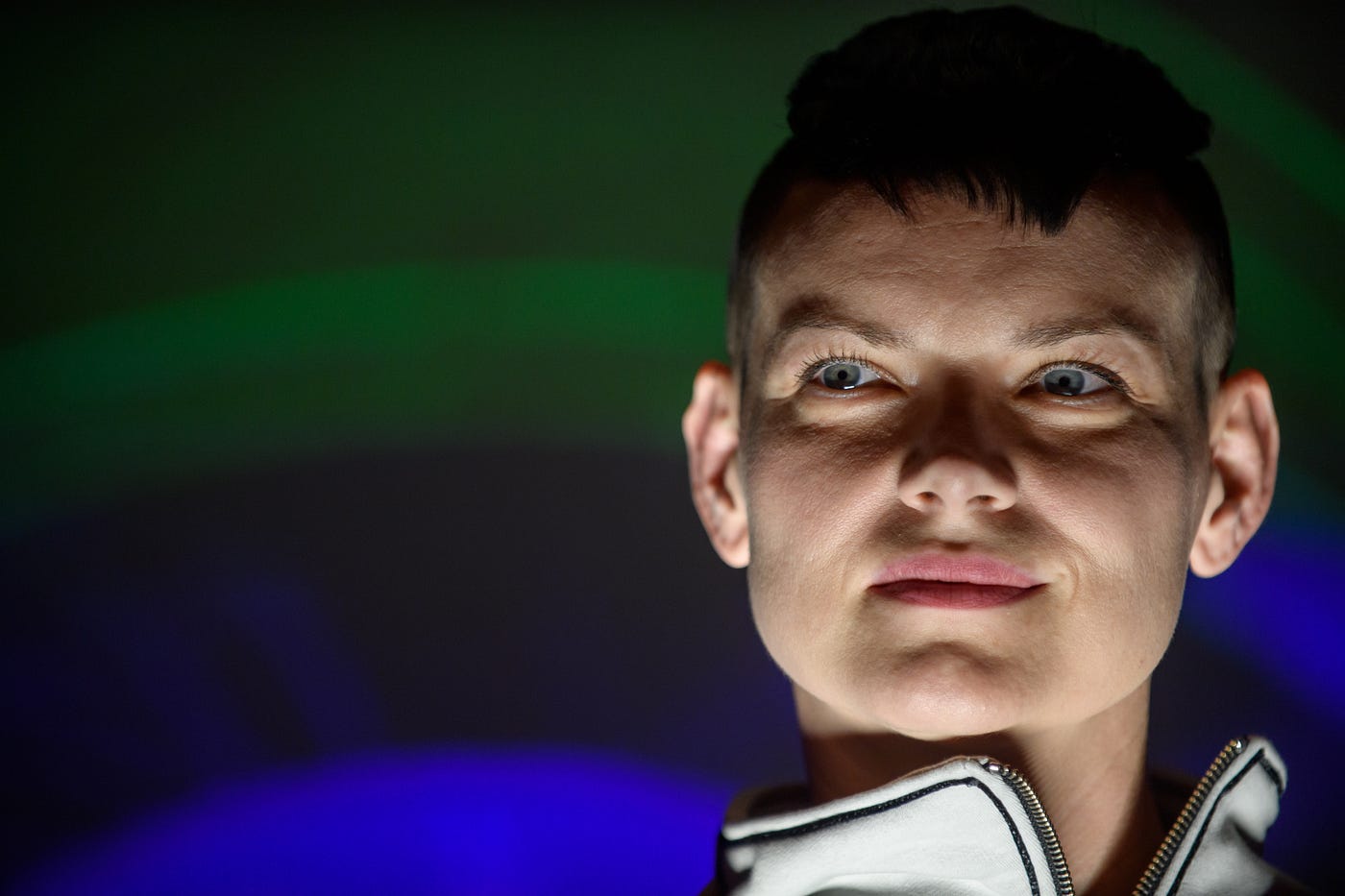
(This review contains mild-to-moderate spoilers.)
Over seven years ago, I attended Bricolage’s STRATA, a sprawling immersive experience in a former Bally’s gym in downtown Pittsburgh. The lighter tone, structure, and overall goals for the piece stood in sharp relief to the dark and serious immersive works I had been seeing in NYC at the time and it helped round out my sense of what immersive theatre could look and feel like. Since then, I have seen a number of Bricolage’s works and always appreciate their unique voice, but I mention STRATA now because of a particular set of expectations it created for me that did not materialize during the experience. If you pardon me quoting my former self from a blog post I wrote after attending STRATA:
“There were hints here and there that a twist or counter-narrative may develop and that I might be faced with a choice, and some sort of urgency would arise from my decisions. None of that came to pass.”
Is it possible that way back then, Bricolage had a nascent idea of adding another layer of complexity and gamification to their production, or was it just all in my head?
Whatever its genesis, Project Amelia has all of what I expected from STRATA and more: overlapping narratives, multiple (but flexible) pathways, a lot of simultaneous action, a variety of possible endings, and a solid dose of audience agency, all instilled with a sense that there are real stakes involved. In the ongoing struggle between audience agency and scripted performance, Project Amelia manages to strike just the right balance. Here fortune does actually favor the bold, and both individual decisions and our collective decisions do shape the overall narrative. The choice to do this felt risky at times, and surely some audiences threaten to take the whole thing totally off the rails, but the cast and crew of Project Amelia appeared to be prepared for whatever may come up during the performance and I always felt like we were being taken care of. For all these reasons, this is a must-see show for immersive fans. (So stop reading and get yourselves to Pittsbugh!)
Project Amelia’s onboarding experience was an efficient and elegant way to process sixty audience members. You were given a color-coded RF-tracking bracelet and a smartphone to mess with while you wait for things to start. The bracelet identified your role and primary “track” in the experience. The device then let you edit your personal data (oh, did I mention that you were required to fill out an online questionnaire before your arrival?) and add comments to a chat group shared by everyone else in the experience regardless of track. You also had access to a sub-group chat specific to the story path you are assigned. As the chat groups start to populate, you begin to notice postings from in-show characters responding to you in real time.
You were also given a bag that nullified your own smartphone, so the whole audience clung to their given in-show devices throughout the experience. These then work as a kind of methadone for device withdrawal, effectively satiating that pacifier-like need to check your device while keeping you in the experience each time you do. As a result, most of the audience was glancing at their phones throughout the experience with utter impunity. Those who have been to a tech conference any time in the last ten years may feel this is that extra touch of immersive theatre realism they have been missing all this time. Others might find it annoying, but hey, it’s all in the game.
The device we each carried came to serve a few key purposes. Announcements on the main chat board would let you know when major events were happening. Use of these devices also let the audience make cheeky live commentary, of the kind you may experience any given minute on social media. The show contained enough light humor to allow space for whatever cleverness the audience wanted to add to the backchannel. For instance, when one audience member commented, “You would think that board members would get better seats for the keynote,” as they were all stuck in the back, with everyone participating in the experience feeling like they were “in” on the joke. Many audience members may find their sub-group chat to be far more interesting as it allows you to share the information you gather during the evening’s events without having to run around and physically tell everyone you are “working” with what you have discovered. It nicely removed the friction to sharing information over what must be about 20,000 square feet of warehouse space. Of course, how you use it is up to you, and some may decide that sharing information is not in their best interests.

As for “information,” what little you do know upon entering, is that you have been invited to visit Aura, a visionary tech company you have come to know and love, on the night they will unveil “Amelia,” their latest ground-breaking product. Project Amelia is meant to be taken as satire and the target is crystal clear. A modern tech company, and the marketing bubble that envelops it, may be just about the fattest, widest target available at the moment, but Bricolage nonetheless hits it squarely. After a brief video intro customized for our group, we were set loose in the space, which was already bustling with activity. My early encounters with characters felt natural and the costume, set, and sound details all clicked into place to set up the premise: the show takes place approximately fifteen minutes into the future.
When Aura’s CEO unveils “Amelia” during an introductory keynote, it feels like a direct parody of Steve Job’s introduction of the iPhone in 2007. (The name Aura may itself be a reference to the famous “reality distortion field” that Apple conjures with each new project release.) Amelia is clearly meant to be the product of Apple, Google, and Facebook having a three-way lovechild. What could go wrong?
This experience is designed to make us think about data privacy, AI, and the pace of technological innovation. I am burying this fact in the middle here because you are sure to say, “oh, that sounds very important and thank you, but I have more pressing things to do with my evening like re-take that Harry Potter quiz because I just *know* that I really belong in Gryffindor.” But listen — this show makes technology ethics fun! And they are not merely dabbling in technology, either: the production was created in collaboration with Probable Models (a think tank focused on ethics in the tech industry) and the whole thing (prepare for major meta twist) is being used as an experiment conducted by researchers at Carnegie Mellon University. At the end, you get to opt in or out of having your data used in their study. So when we hear a stream of dialogue that sounds like Star Trek technobabble during the show, we can all nod along knowing that the real homework has been done.
Early on in the show, I felt hesitant to push the boundaries of the world and the performers’ leeway for improvisation. But one of my fellow travelers on my path had no such hesitations and pressed forward with a great deal of moral certitude…and the show began to reward them for it. When I saw my fellow participant deliver a key piece of information to one of the characters, there appeared to be an actual shift in her story arc. At that point I realized it was game on! I wanted to test the limits and rules of the world. And yes, there were limits, and there was some confusion about rules and where you could be at certain times, but I did uncover a system with a lot of moving pieces and layers and possibilities as I began to dig deeper into the show. There are a number of potential endings and some endings may have hybrid outcomes. From what I saw unfold, I could see maybe three or four potential endings coming to a head during my particular showing. The show runners must have selected which one was most dominant or simply came to fruition first. By the end, a lot of the audience were doing a lot of work and I was breathlessly pulled into three other tracks aside from the one I started with.
Get Glenn Ricci’s stories in your inbox
Join Medium for free to get updates from this writer.
SubscribeSubscribe
Then we won the game! Well, Bricolage states that the production is not a game, per se, and Project Amelia is really about the experience itself, but our actions did in fact slay the metaphorical dragon. Amelia ain’t happening and you can all rest easy, at least for tonight. High-fives and fist-bumps all around. I know every audience has its own personality and in other scenarios I imagine Amelia is released into the world on other nights, damn the consequences. But not this night!
It felt good, but our win was short-lived. Is it really possible to halt all present and future progress on a new technology just by exposing the unethical manner in which it was created? Did I actually just learn how to hack a company and interrupt their global operations? (Not really, unless they are all run like an escape room.) So what have we really learned here?I think the answer lies with Amelia and her relationship with the audience. First of all, it must be said that Jocelyn Wrzosek’s performance as Amelia would be considered a tour de force in any medium. It is one thing to embody an AI robot constantly learning new things and teetering on meltdown as the audiences peers at her from all directions and distances. Doing that, while fielding stray questions and comments from the audience (who she was magically able to identify by sight) without missing a beat was fantastically impressive. Among a solid cast, all turning out spot-on performances, Wrzosek stands out.

It was also through the audience interactions that I came to realize we actually need Amelia. We are not so great at understanding what the little black boxes in our pockets are doing. But when technology comes to us in human form and begins trampling all over social norms and customs with her superhuman AI abilities, well, that is when we freak out. We watched Amelia joyfully play Insta-Tinder out loud with another character’s personal life, and we all laughed. She did this sort of thing a number of times and the joke never got old. We laughed not because this is something any third-rate hacker can do right now, but because here is a computer in corporeal form doing it all in their heads and delivering it with a smile. When it is suggested that her actions might be inappropriate, she is confused and delivers some form of the Silicon Valley corporate mantra: why would you not want technology to make life better?
The audience I was a part of was not signing up for one damn bit of this. They reacted negatively not just to the idea of Amelia, and everyone who created her, but also to Amelia herself. She was, in fact, the subject of some amount of verbal abuse from our audience. The actress was fully prepared for this possibility and handled it with stunning equanimity. But I wonder: do these same people get similarly angry at Alexa or Siri or Facebook or their own mobile phones for the damage they cause? Something tells me they do not, but once all that same technology is built into a humanoid, it feels like a significant boundary is crossed. (Did you get that, CMU researchers?)
I would hope that this message unfolds in some form at every showing. The scripted elements provide a solid but familiar framework, and the experience sets up a ripe set of conditions for these more profound ideas to emerge. But it might not on a given night, or parts of the audience might miss it, which I think would be a shame.
Remember when telephones were things people only used for private conversations in private places? Maybe you do not. I do, and still think it strange that anyone would want to broadcast the personal minutiae of their day to anyone within earshot, even though it is happening around me all the time. I am stunned daily by the information people will post online in plain view to a semi-permanent record. Did I miss the official meeting when we all decided to amend the social contract to declare that okay? And it won’t be long before public spaces are suddenly crowded with “Amelias” chasing after their users and barking out all sorts of information that we may have once considered private and personal.

Kudos to Bricolage et al for bringing us such an engaging thought piece about a set of issues which impact everyone and yet not nearly enough people are thinking about. The only shortcoming I could see from the production was that neither I nor my three friends could find a lot of room in the story for the counter-counter narrative. That is, we could see many reasons for audience members to choose to shut the whole thing down, but saw no available options in the experience to ensure that progress happens in a better way or nullify the damage Aura might cause on their way to bringing Amelia to market. It was difficult to envision an outcome in which our lives actually get better. This level of cynicism is common in futuristic science fiction, but it does not appear the be the goal of Probable Models or any of the other entities who have signed on to the project. If that collaboration cannot produce a positive vision for the future within a world they created, it makes me think that the singularity is still very, very far away.
Early on in the evening, it is suggested that the technology to create Amelia was derived via nefarious and unethical means. But what if it was not? What if the technology was carefully considered, ethically sourced, and released after extensive quality assurance testing, all with the best of intentions? What if the unveiling was framed by a public discussion about the ethical ramifications of semi-sentient AI humanoids who know everything about us? What if new laws were passed to place clear parameters on how such a humanoid can be used? At that point, who can we hack to make sure we all stay safe? Where is the dragon then and what does slaying it look like
Project Amelia as a show has many moving parts and needs to hit so many marks that demanding it answer all these questions is a very big ask. I can see it setting up a very productive conversation afterwards, however. It certainly did for my group, as we drank beers, discussed the show, and — of course — reconnected with the outside world via our own phones.
Project Amelia continues in Pittsburgh through November 3. Tickets are $50–70.
Glenn Ricci is a guest contributor and Co-artistic Director of Submersive Productions in Baltimore, Maryland.
NoPro is a labor of love made possible by our generous Patreon backers. Join them today!
In addition to the No Proscenium web site, our podcast, and our newsletters, you can find NoPro on Twitter, Facebook, YouTube, Instagram, in the Facebook community Everything Immersive, and on our Slack forum.
Office facilities provided by Thymele Arts, in Los Angeles, CA.


















Discussion